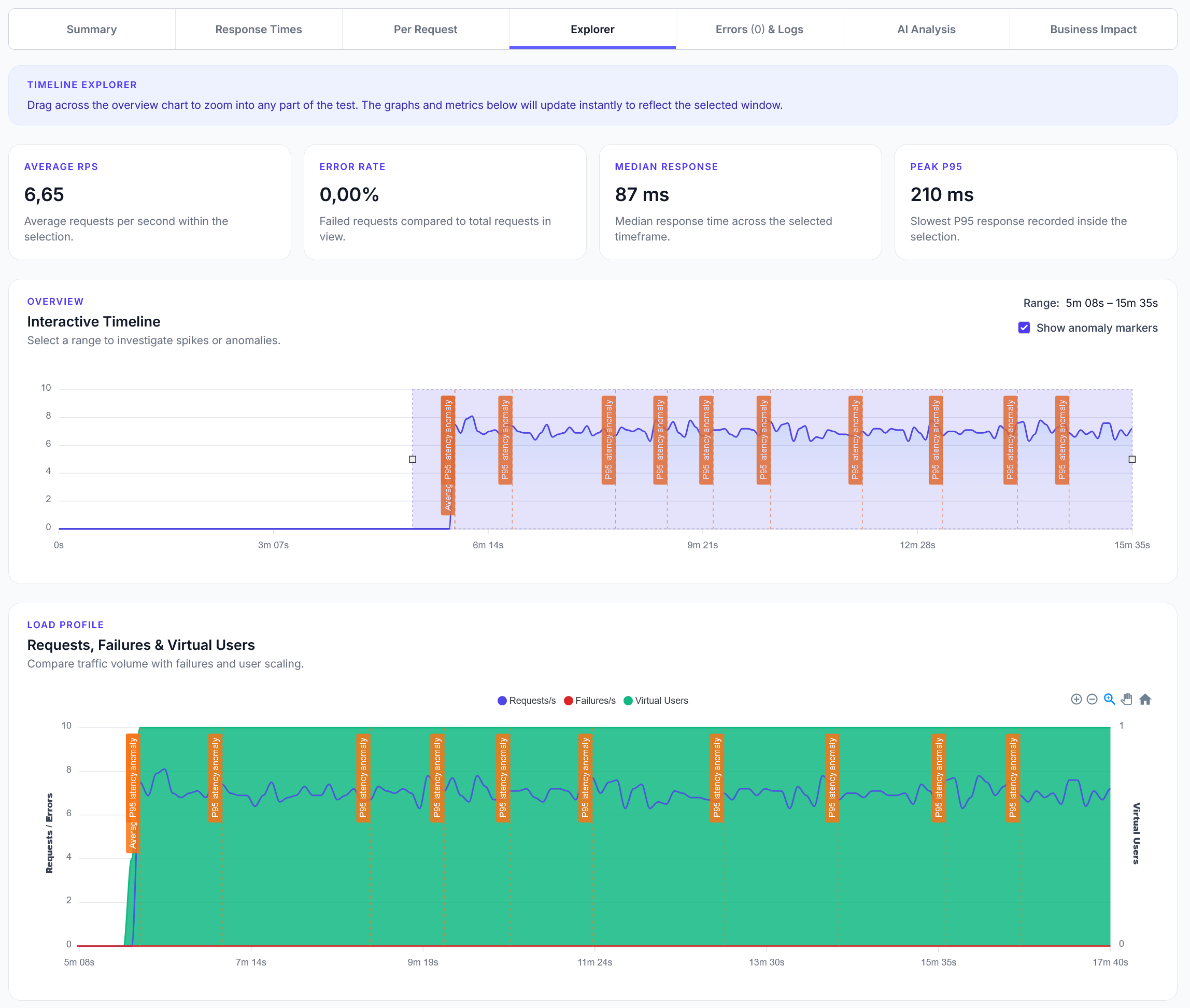
Explorer reports addition
We have added a new Explorer feature to reports, with a timeline scrubber and easy anomaly detection.
Basic API contract testing with response schema validation and status code checking
LoadForge can record your browser, graphically build tests, scan your site with a wizard and more. Sign up now to run your first test.
This guide shows how to test API contracts by validating response schemas and status codes. Perfect for ensuring API consistency and catching breaking changes.
from locust import task, HttpUser
import json
class ContractTestUser(HttpUser):
def on_start(self):
# Expected API contracts
self.contracts = {
"/api/users": {
"status_code": 200,
"required_fields": ["id", "name", "email"],
"field_types": {
"id": int,
"name": str,
"email": str
}
},
"/api/products": {
"status_code": 200,
"required_fields": ["id", "name", "price"],
"field_types": {
"id": int,
"name": str,
"price": (int, float)
}
},
"/api/orders": {
"status_code": 200,
"required_fields": ["id", "user_id", "total"],
"field_types": {
"id": int,
"user_id": int,
"total": (int, float)
}
}
}
@task(3)
def test_users_contract(self):
"""Test users API contract"""
endpoint = "/api/users"
with self.client.get(endpoint, name="Users Contract") as response:
self.validate_contract(endpoint, response)
@task(2)
def test_products_contract(self):
"""Test products API contract"""
endpoint = "/api/products"
with self.client.get(endpoint, name="Products Contract") as response:
self.validate_contract(endpoint, response)
@task(2)
def test_orders_contract(self):
"""Test orders API contract"""
endpoint = "/api/orders"
with self.client.get(endpoint, name="Orders Contract") as response:
self.validate_contract(endpoint, response)
@task(1)
def test_single_user_contract(self):
"""Test single user API contract"""
endpoint = "/api/users/1"
with self.client.get(endpoint, name="Single User Contract") as response:
# Use same contract as users list but for single item
if response.status_code == 200:
try:
data = response.json()
self.validate_single_item_schema(data, self.contracts["/api/users"])
print("Single user contract: PASSED")
except Exception as e:
response.failure(f"Single user contract failed: {e}")
elif response.status_code == 404:
print("Single user contract: User not found (acceptable)")
else:
response.failure(f"Unexpected status code: {response.status_code}")
def validate_contract(self, endpoint, response):
"""Validate API response against contract"""
if endpoint not in self.contracts:
response.failure(f"No contract defined for {endpoint}")
return
contract = self.contracts[endpoint]
# Check status code
if response.status_code != contract["status_code"]:
response.failure(f"Status code mismatch: expected {contract['status_code']}, got {response.status_code}")
return
# Parse JSON response
try:
data = response.json()
except json.JSONDecodeError:
response.failure("Invalid JSON response")
return
# Handle both single items and arrays
if isinstance(data, list):
if len(data) > 0:
self.validate_single_item_schema(data[0], contract)
print(f"Contract validation for {endpoint}: PASSED (array with {len(data)} items)")
else:
self.validate_single_item_schema(data, contract)
print(f"Contract validation for {endpoint}: PASSED")
def validate_single_item_schema(self, item, contract):
"""Validate a single item against the contract schema"""
# Check required fields
for field in contract["required_fields"]:
if field not in item:
raise ValueError(f"Missing required field: {field}")
# Check field types
for field, expected_type in contract["field_types"].items():
if field in item:
if not isinstance(item[field], expected_type):
raise ValueError(f"Field {field} has wrong type: expected {expected_type}, got {type(item[field])}")
@task(1)
def test_error_responses(self):
"""Test error response contracts"""
# Test 404 response
with self.client.get("/api/users/99999", name="404 Error Contract") as response:
if response.status_code == 404:
try:
error_data = response.json()
# Basic error response structure
if "error" in error_data or "message" in error_data:
print("404 error contract: PASSED")
else:
response.failure("404 response missing error message")
except json.JSONDecodeError:
response.failure("404 response not valid JSON")
else:
response.failure(f"Expected 404, got {response.status_code}")
@task(1)
def test_post_contract(self):
"""Test POST request contract"""
user_data = {
"name": "Test User",
"email": "test@example.com"
}
with self.client.post(
"/api/users",
json=user_data,
name="POST Contract"
) as response:
if response.status_code in [201, 200]:
try:
created_user = response.json()
# Validate created user has required fields
required_fields = ["id", "name", "email"]
for field in required_fields:
if field not in created_user:
response.failure(f"Created user missing field: {field}")
return
# Validate the data we sent is reflected
if created_user["name"] != user_data["name"]:
response.failure("Created user name doesn't match input")
return
if created_user["email"] != user_data["email"]:
response.failure("Created user email doesn't match input")
return
print("POST contract validation: PASSED")
except json.JSONDecodeError:
response.failure("POST response not valid JSON")
elif response.status_code == 400:
# Bad request is acceptable for validation errors
print("POST contract: Validation error (acceptable)")
else:
response.failure(f"Unexpected POST status code: {response.status_code}")
The guide validates:
Add more validation rules: